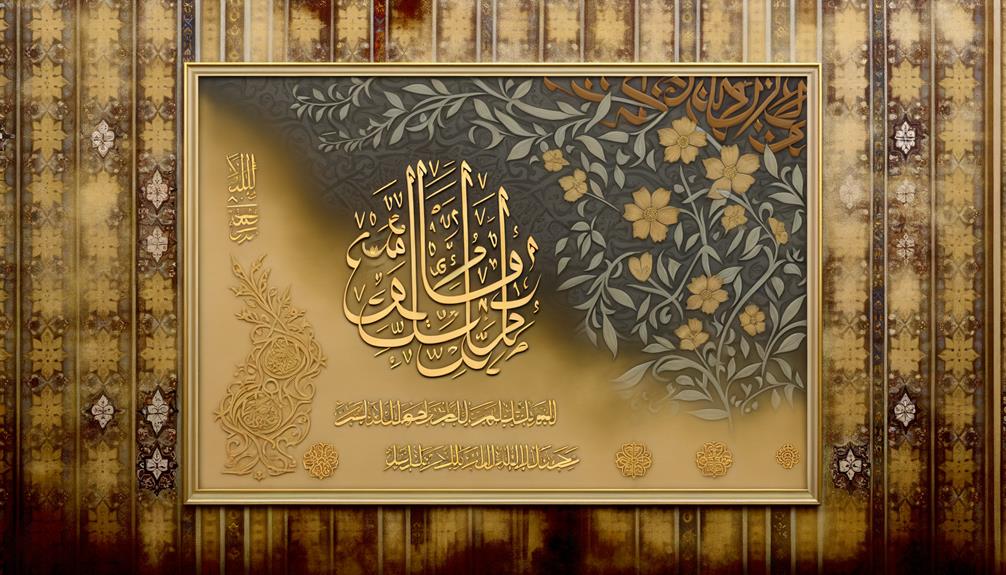Zain Name Meaning in Islam
The name Zain, rooted in the Arabic word 'zayn,' signifies 'beauty' or 'grace' and holds substantial cultural and spiritual importance in Islamic tradition. It exemplifies not only physical attractiveness but also moral virtues such as humility, patience, and compassion.
Embodying both aesthetic and moral refinement, the name is cherished for promoting personal growth and a deep spiritual connection. Historically, it has been borne by esteemed figures such as Zain ul-Abidin and Zain al-Din al-Iraqi, contributing to its enduring appeal.
With these layers of meaning, the name Zain remains a popular choice among Muslim families seeking to honor their heritage and values.

Key Takeaways
- The name Zain derives from the Arabic root word 'zayn,' meaning beauty or grace.
- It symbolizes virtues highly esteemed in Islamic teachings, such as humility, patience, and compassion.
- Zain represents both physical attractiveness and moral integrity, aligning with Islamic values.
- Historically, it has been borne by notable Islamic figures, enhancing its cultural and spiritual significance.
- The name reflects a desire for personal growth, spiritual connection, and adherence to divine attributes.
Origin and Etymology
The name 'Zain' originates from Arabic, where it is derived from the root word 'zayn,' meaning beauty or grace. This etymological foundation is deeply embedded in the Arabic language and culture, reflecting aesthetic and moral virtues.
In classical Arabic, 'zayn' embodies not just physical attractiveness but also the qualities of goodness and integrity. The usage of 'Zain' as a name is widespread across various Arabic-speaking regions, signifying its cultural resonance and popularity.
Historically, the name has been borne by notable figures, further enriching its legacy. Its phonetic simplicity and profound meaning contribute to its enduring appeal, making ‘Zain’ a name that encapsulates both elegance and virtue in the Islamic world. The name is not only prevalent in various cultures but also resonates deeply within families, often passed down through generations. In addition to its charm, the zahra name significance in urdu reflects qualities of purity and grace, further enhancing its popularity among those seeking a meaningful name for their children. As society evolves, ‘Zain’ continues to symbolize a harmonious blend of tradition and modernity, appealing to parents who value both heritage and contemporary relevance.
Spiritual Significance
The name Zain holds profound spiritual significance within Islamic tradition. It symbolizes both inner personal growth and a deep connection to the divine. It embodies a journey towards self-improvement and moral integrity, reflecting the virtues that are highly esteemed in Islamic teachings.
Additionally, Zain serves as a reminder of the intrinsic bond between the individual and the Almighty, fostering a sense of spiritual awareness and devotion.
Inner Personal Growth
In the context of Islamic teachings, the name Zain carries profound spiritual significance that can inspire inner personal growth and a deeper connection to one's faith. Derived from the Arabic root meaning 'beauty' or 'grace,' the name Zain serves as a reminder of the inner beauty and moral excellence that one should endeavor to cultivate.
This name encourages individuals to engage in self-reflection, nurturing virtues such as humility, patience, and compassion. By embodying these qualities, one aligns closer with Islamic principles, fostering a harmonious and spiritually enriched life.
The pursuit of personal growth, in this instance, becomes a journey of aligning one's character with divine attributes, promoting both personal fulfillment and societal harmony.
Divine Connection Symbolism
Symbolizing a profound divine connection, the name Zain embodies a spiritual significance that transcends mere nomenclature, encapsulating the essence of grace and beauty as reflections of divine attributes. In Islamic tradition, names are more than identifiers; they are imbued with deep meaning and purpose. The name Zain, often associated with virtue and elegance, serves as a reminder of the divine qualities human beings should aspire to emulate.
| Symbol | Spiritual Significance |
|---|---|
| Grace | Divine elegance |
| Beauty | Reflection of divine creation |
| Virtue | Moral excellence |
| Harmony | Inner peace and balance |
This profound connection fosters a sense of spiritual awareness, guiding individuals towards a life of moral integrity and inner peace.
Historical Usage
Tracing its roots back to early Islamic history, the name Zain has been borne by numerous notable figures, reflecting its enduring significance and widespread usage.
One eminent bearer of the name was Zain ul-Abidin, the fourth Imam in Shia Islam, renowned for his piety and scholarly contributions.
Another historical figure is Zain al-Din al-Iraqi, a distinguished 14th-century Islamic scholar whose works have had a lasting impact on Hadith studies.
The name's prevalence extends beyond these prominent individuals, as it has consistently been chosen by Muslim families for its connotations of grace and beauty.
This historical continuity underscores the deep cultural and spiritual resonance the name Zain holds within the Islamic tradition.
Cultural Impact
The name Zain holds significant cultural impact, marked by its popularity across various regions where it is cherished for its profound meaning and historical roots.
Its influence extends into modern media, where it is often featured in literature, film, and television, further solidifying its place in contemporary cultural consciousness.
Additionally, the name's historical significance within Islamic tradition adds layers of reverence and respect, enriching its cultural resonance.
Popularity Across Regions
How has the name Zain achieved varying degrees of popularity and cultural importance across different regions within the Islamic world?
The name Zain, rooted in the Arabic word for 'beauty' or 'grace,' has garnered widespread acceptance and admiration across various Islamic cultures. Its prevalence, however, varies considerably from one region to another, influenced by local traditions, linguistic preferences, and historical contexts.
In the Middle East, Zain is a common name, reflecting its deep cultural resonance.
In contrast, South Asian countries exhibit a moderate adoption, where it competes with other traditional names.
Meanwhile, in Southeast Asia, particularly in Malaysia and Indonesia, Zain enjoys notable popularity due to historical Arab influences and the spread of Islam.
Influence in Modern Media
Modern media has greatly amplified the cultural impact of the name Zain, embedding it within the global consciousness through its presence in literature, film, and digital platforms.
Notable characters named Zain appear in contemporary novels and television series, contributing to the name's prominence and appeal. Moreover, the digital age has facilitated the rise of influencers and public figures bearing the name Zain, who have garnered significant followings across social media platforms.
This widespread visibility underscores the name's versatility and resonance in diverse contexts. As a result, Zain has transcended its traditional roots to become a symbol of modernity and cultural interconnectedness, reflecting the dynamic interplay between heritage and contemporary expression.
Historical Significance
In Islamic history, the name Zain carries profound cultural significance, rooted in its association with esteemed figures and its enduring presence in religious and historical narratives.
The name Zain, meaning 'beauty' or 'grace,' is often linked to Zain-ul-Abidin, the fourth Imam in Shia Islam, revered for his piety and scholarship.
The name also appears in various Islamic texts and literature, highlighting its longstanding cultural resonance.
- Zain-ul-Abidin's Legacy: Known for his devoutness and contributions to Islamic theology.
- Literary References: Frequently mentioned in classical Islamic poetry and prose.
- Cultural Symbolism: Represents ideals of beauty, virtue, and moral integrity in Islamic tradition.
These points elucidate the historical and cultural depth associated with the name Zain.
Famous Namesakes
Numerous prominent individuals bearing the name Zain have made significant contributions to various fields, reflecting the name's esteemed status within Islamic culture.
Zain-ul-Abidin, a notable 15th-century ruler of Kashmir, is revered for his fair governance and efforts to promote arts and culture.
In modern times, Zain Verjee, a distinguished journalist, has gained international recognition for her work with CNN, embodying the name's association with beauty and grace.
Additionally, Zain Bhikha, a celebrated South African singer-songwriter, has made impactful contributions to Islamic music, enriching the cultural and spiritual tapestry of the Muslim world.
These illustrious figures exemplify the diverse domains in which individuals named Zain have excelled, underscoring the name's enduring legacy and widespread reverence.
Choosing Zain Today
When selecting the name Zain for a child today, parents are often influenced by its rich historical significance and the virtues it represents within Islamic tradition. The name Zain, derived from Arabic, embodies beauty, grace, and adornment, making it a popular choice among Muslim families. Its association with notable Islamic figures further enhances its appeal.
Choosing Zain reflects a desire to imbue a child with qualities of:
- Grace and Elegance: The name signifies beauty and refinement.
- Spiritual Heritage: It connects the bearer to a profound religious and cultural legacy.
- Positive Attributes: The name is often linked to virtues such as honor and integrity.
Such considerations make Zain a meaningful and esteemed choice in contemporary Muslim communities.
Conclusion
To sum up, the name Zain, rooted in Islamic tradition, carries with it a rich tapestry of historical, spiritual, and cultural significance.
The name's etymology reflects beauty and grace, while its historical usage underscores its enduring appeal.
The cultural impact of Zain is notable, spanning various regions and eras, and its spiritual significance cannot be overstated.
With famous namesakes adding to its allure, choosing Zain today is akin to finding a hidden gem, blending tradition with contemporary relevance.






